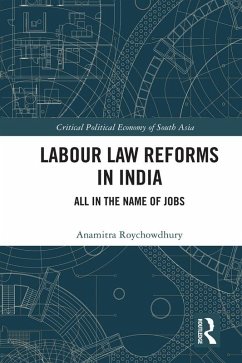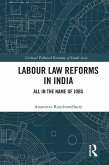This book provides a theoretical framework to understanding labour market flexibility, and empirically examines to what extent India's 'jobless growth' may be attributed to labour laws. There is a pervasive view that the country's low manufacturing base and inability to generate jobs is primarily due to rigid labour laws. Therefore, job creation is sought to be boosted by reforming labour laws. However, the book argues that if labour laws are made flexible, then there are adverse consequences for workers: dismantled job security weakens workers' bargaining power, incapacitates trade union movement, skews class distribution of output, dilutes workers' rights, and renders them vulnerable.
Dieser Download kann aus rechtlichen Gründen nur mit Rechnungsadresse in A, B, BG, CY, CZ, D, DK, EW, E, FIN, F, GR, HR, H, IRL, I, LT, L, LR, M, NL, PL, P, R, S, SLO, SK ausgeliefert werden.









